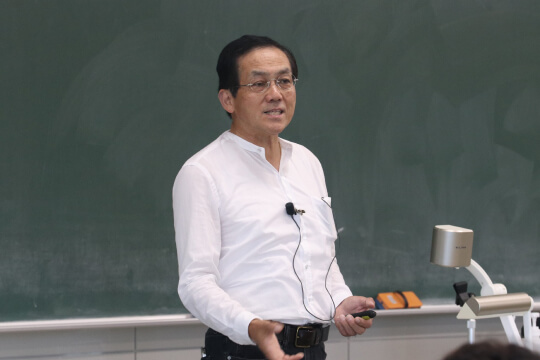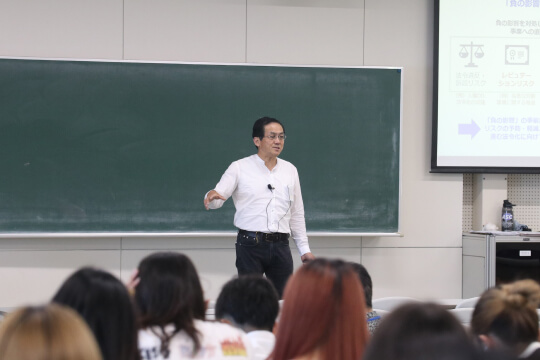Special Lecture on "Labor and Human Rights" Featuring the ILO Office for Japan Director
On Tuesday, July 23, 2024, Professor Shunsaku Hashimoto from the College of Sustainability and Tourism hosted a special lecture on "Labor and Human Rights" as part of his "Hospitality Marketing and Hospitality Operations" course. The lecture featured Mr. Shinichi Takasaki, the Director of the International Labour Organization (ILO) Office for Japan.
The ILO, established in 1919 as a specialized United Nations agency, addresses labor issues with the aim of achieving social justice through the resolution of labor problems. Today, the ILO has 187 member states. The organization focuses on various labor issues, including poor working conditions in developing countries, child labor, and forced labor in both developing and developed nations. Using case studies and statistics, Mr. Takasaki explained the current state of these issues, emphasizing that they are relevant not only to those directly affected but to everyone in today's global society.
The lecture also touched on labor issues within the hospitality industry, which is closely related to the college's academic focus. Mr. Takasaki highlighted the prevalence of harassment and gender-based human rights violations in the industry. He noted that while these problems may not be as visible in Japan, they are indeed present, and it is crucial to pay attention to global trends to address them effectively.
Mr. Takasaki emphasized the importance of Japanese university students becoming aware of labor issues both domestically and internationally. He encouraged students to research and consider the manufacturers of the products they use, in order to avoid contributing to human rights abuses. He also urged students to educate themselves on various labor issues, so they can protect their own rights in the workplace.
Additionally, Mr. Takasaki discussed the ILO's current focus on promoting human rights within businesses under the concept of "Business and Human Rights." While companies are primarily profit-driven, he explained that by prioritizing human rights, they can mitigate various risks, enhance their corporate value, and become more attractive to investors and job seekers. The ILO dedicates 90% of its efforts to supporting corporate human rights protection, driven by the belief that in today's world, where businesses hold immense power, companies that respect human rights have the potential to achieve unprecedented success.
In closing, Mr. Takasaki offered students practical advice on what they can do now to shape the future of their careers. He suggested staying informed on labor issues through news articles and reports, attending seminars hosted by the ILO Japan Office and other UN agencies to develop a global perspective, practicing ethical consumption by choosing fair trade products, and discussing what they've learned with family and friends. The lecture concluded with a wide range of questions from students, covering topics such as the Technical Intern Training Program, ESG investment, and child labor, to which Mr. Takasaki provided thoughtful and detailed responses.











